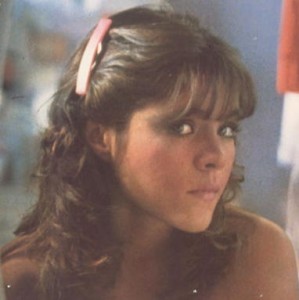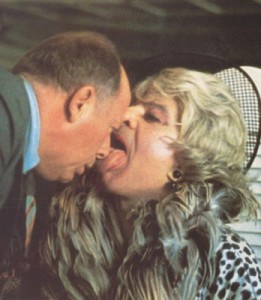Angel
 The 1980’s was a decade that often had conflicting values, which were morally conservative, yet socially irresponsible. Nowhere was this better exemplified than with the way that the Grindhouse exploitation movies of the 70’s became unsubtly repressed in the 80’s, mixing beloved trash with fearful cautionary tales that punished pleasure.
The 1980’s was a decade that often had conflicting values, which were morally conservative, yet socially irresponsible. Nowhere was this better exemplified than with the way that the Grindhouse exploitation movies of the 70’s became unsubtly repressed in the 80’s, mixing beloved trash with fearful cautionary tales that punished pleasure.
This period hit its peak in the mid 80’s with a series of thematically similar female-centric (and female loathing) movies, Streetwalkin’, Savage Streets, and Angel. Savage Streets uses the revenge formula, as Linda Blair gets payback against the overacting, 30-year-old teenage thugs who raped her deaf sister into a coma. Streetwalkin’ and Angel both deal with prostitution, and while Streetwalkin’ oozes sleaze and Angel is comparatively chaste, the overall message is pretty much the same. In Streetwalkin’, it’s “Stay in your cornpone Midwest town and never come to the big city, lest you want to be turned into a hooker and beaten by your killer pimp.” In Angel, it’s “Stay in school and don’t get murdered by an egg-loving serial killer.” [Savage Streets says to us that if you have hearing problems you “shouldn’t flirt with Mohawk-donning Julliard graduates.”]
Angel’s egg scene is actually one of its furthest extremes; John Diehl’s jittery and hysterical killer enjoys cracking the top off an egg and drinking its buried juices. For a movie about a student-by-day, hooker-by-night, there’s not a lot of sex in Angel, in fact our 15-year-old heroine (named Angel during her evening dalliances, Molly during her studies) doesn’t appear to have any sex at all. It isn’t that the sex is off-screen, Angel simply never consummates anything that we see. Transactions are interrupted or are bait for the killer, but nothing that actually suggests that she’s even lost her virginity, despite paying for her own apartment via her trade.
 Angel’s hypocritical purity fits with its look; it’s shot exactly like a TV movie, and with a little editing, it could play safely on a Sunday night after 60 Minutes. Angel’s TV feel extends to the casting; especially Dick Shawn as a transvestite hooker who is supposed to be outrageous (“Two blind lesbians lost in a fish market. THAT is crazy. Get it?”), but Shawn plays him just as broadly as Jack Lemmon in Some Like it Hot. We even get the hooker bonding sequences, where they cavort at late-night diners, like an episode of Sex and the City. The dialogue is a slight improvement (“you’re nothing but a damn… Cop!”), especially the deep psychological insight of the detectives chasing the killer: “He’s probably bisexual, impotent, and was beaten by his daddy.” Freud would have been proud.
Angel’s hypocritical purity fits with its look; it’s shot exactly like a TV movie, and with a little editing, it could play safely on a Sunday night after 60 Minutes. Angel’s TV feel extends to the casting; especially Dick Shawn as a transvestite hooker who is supposed to be outrageous (“Two blind lesbians lost in a fish market. THAT is crazy. Get it?”), but Shawn plays him just as broadly as Jack Lemmon in Some Like it Hot. We even get the hooker bonding sequences, where they cavort at late-night diners, like an episode of Sex and the City. The dialogue is a slight improvement (“you’re nothing but a damn… Cop!”), especially the deep psychological insight of the detectives chasing the killer: “He’s probably bisexual, impotent, and was beaten by his daddy.” Freud would have been proud.



